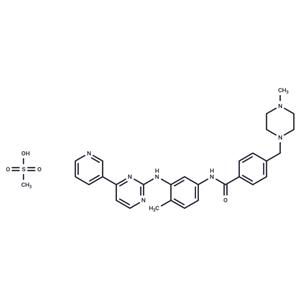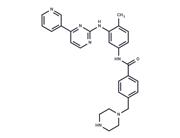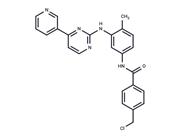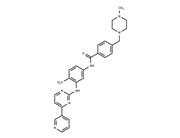| Name | Imatinib Mesylate |
| Description | Imatinib Mesylate (STI-571) is a tyrosine kinase receptor inhibitor with antineoplastic activity (IC50s: 0.6 μM, 0.1 μM and 0.1 μM for v-Abl, c-Kit and PDGFR, respectively). |
| Cell Research | Cells were added to 96-well plates at a density of 20?000 cells/well for HMC-1 and 50?000 cells/well for M-07e. Experiments with M-07e were performed with the use of GM-CSF or SLF as a growth factor supplement. Experiments using HMC-1 were performed without growth factor supplementation. Proliferation at 48 hours was measured with an XTT-based assay [1]. |
| Animal Research | Heterozygous experimental TRAMP mice were obtained by breeding wild-type C57BL/6 male mice and heterozygous female TRAMP mice. MC-deficient C57BL/6-KitW-sh/W-sh mice were intercrossed over 12 generations with TRAMP mice to obtain MC-deficient KitWsh-TRAMP mice. Cromolyn (10 mg/kg dissolved in saline; Sigma Aldrich) or imatinib (50 mg/kg dissolved in saline) were administered intraperitoneally in TRAMP mice for 5 days/week. Treatments started at 8 or 16 weeks, as indicated in text and figures, and continued for the duration of the experiment. Mice were sacrificed at 25 weeks and their urogenital apparatus collected for IHC [4]. |
| In vitro | Inhibition of Steel factor (SLF)-induced c-kit autophosphorylation by STI 571 was dose-dependent, with complete inhibition observed at both 10 and 1.0 μmol/L. Inhibition was also apparent at a dose of 0.5 μmol/L, although limited c-kit autophosphorylation still occurred. Complete inhibition of MAP kinase activation occurred at 10- and 1.0-μmol/L concentrations of STI 571. Partial inhibition was observed at a dose of 0.1 μmol/L, and no inhibition occurred at a dose of 0.01 μmol/L. Total MAP kinase expression was not altered by treatment with STI 571 [1]. Exposure of cells to 1 μM STI571 for 24 hours before lysis resulted in a reduction of cellular tyrosine phosphorylation in general and of TEL/ARG specifically [2]. Imatinib had a more similar effect on Bcr/Abl- and c-Kit–dependent proliferation, with an IC50 of 19 nM in R10(-) cells and 82 nM in MO7e cells growing in the presence of SCF (KL, Kit ligand), respectively [3]. |
| In vivo | The treatment of imatinib significantly reduced the incidence of adenocarcinomas (47.1% vs. 76.9% of untreated TRAMP mice) but had no effect against NE tumors, which instead significantly increased in frequency (23.5% vs. 15.4% of untreated TRAMP mice) [4]. In the imatinib group, lung function was improved with a lower W/D ratio. Perivascular edema and neutrophil infiltration were ameliorated. The imatinib group demonstrated maintained expression of VEC, inhibition of pCrkL, and a significantly higher level of interleukin (IL)-10 [5]. |
| Storage | Powder: -20°C for 3 years | In solvent: -80°C for 1 year | Shipping with blue ice/Shipping at ambient temperature. |
| Solubility Information | 10% DMSO+40% PEG300+5% Tween 80+45% Saline : 5 mg/mL (8.48 mM), Sonication is recommended.
H2O : 59 mg/mL (100.05 mM), Sonication is recommended.
DMSO : 237.5 mg/mL (402.74 mM), Sonication is recommended.
|
| Keywords | v-Abl | STI571 | STI 571 | ST1571 Mesylate | ST 1571 Mesylate | SCFR | Platelet-derived growth factor receptor | PDGFR | Inhibitor | inhibit | Imatinib Mesylate | Imatinib | c-Kit | cKit | CD117 | Bcr-Abl | BcrAbl | Autophagy |
| Inhibitors Related | Stavudine | Xylitol | Aceglutamide | Sodium 4-phenylbutyrate | Hydroxychloroquine | Guanidine hydrochloride | Taurine | Valproic Acid | Curcumin | Paeonol | Naringin | Gefitinib |
| Related Compound Libraries | Membrane Protein-targeted Compound Library | Tyrosine Kinase Inhibitor Library | Kinase Inhibitor Library | EMA Approved Drug Library | Anti-Cancer Clinical Compound Library | Anti-Viral Compound Library | Drug Repurposing Compound Library | Inhibitor Library | FDA-Approved Kinase Inhibitor Library | Bioactive Compounds Library Max | Anti-Cancer Active Compound Library | Anti-Cancer Drug Library |

 United States
United States






